一般疑问句和否定句讲解和练习题
陈述句变成一般疑问句和否定句的讲解与专项练习
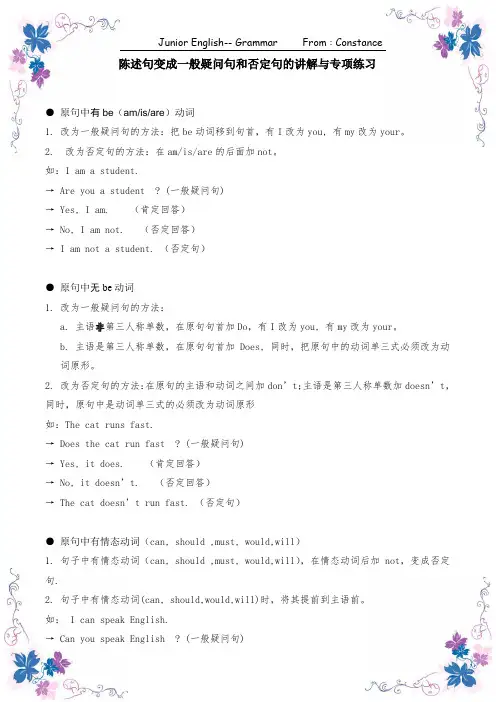
陈述句变成一般疑问句和否定句的讲解与专项练习●原句中有be(am/is/are)动词1.改为一般疑问句的方法:把be动词移到句首,有I改为you, 有my改为your。
2. 改为否定句的方法:在am/is/are的后面加not。
如:I am a student.→ Are you a student ? (一般疑问句)→ Yes, I am. (肯定回答)→ No, I am not. (否定回答)→ I am not a student. (否定句)●原句中无be动词1.改为一般疑问句的方法:a. 主语非第三人称单数,在原句句首加Do,有I改为you, 有my改为your。
b. 主语是第三人称单数,在原句句首加Does, 同时,把原句中的动词单三式必须改为动词原形。
2. 改为否定句的方法:在原句的主语和动词之间加don’t;主语是第三人称单数加doesn’t,同时,原句中是动词单三式的必须改为动词原形如:The cat runs fast.→ Does the cat run fast ? (一般疑问句)→ Yes, it does. (肯定回答)→ No, it doesn’t. (否定回答)→ The cat doesn’t run fast. (否定句)●原句中有情态动词(can, should ,must, would,will)1. 句子中有情态动词(can, should ,must, would,will),在情态动词后加not,变成否定句.2. 句子中有情态动词(can, should,would,will)时,将其提前到主语前。
如: I can speak English.→ Can you speak English ? (一般疑问句)→ Yes, I can. (肯定回答)→ No, I can’t. (否定回答)→ I can’t speak English. (否定句)备注:肯定句中的some在否定句和一般疑问句中应改为any.综合练习题把下列句子改为疑问句并作肯定和否定回答,以及改为否定句。
五年级否定句,一般疑问句,特殊疑问句讲解和练习
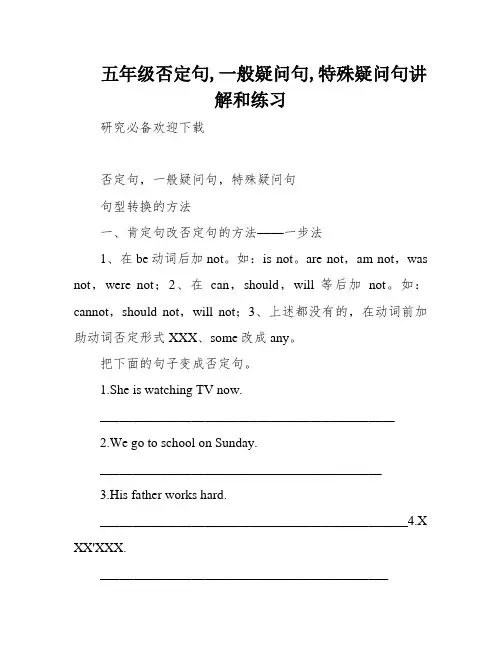
五年级否定句,一般疑问句,特殊疑问句讲解和练习研究必备欢迎下载否定句,一般疑问句,特殊疑问句句型转换的方法一、肯定句改否定句的方法——一步法1、在be动词后加not。
如:is not。
are not,am not,was not,were not;2、在can,should,will等后加not。
如:cannot,should not,will not;3、上述都没有的,在动词前加助动词否定形式XXX、some改成any。
把下面的句子变成否定句。
1.She is watching TV now._____________________________________________2.We go to school on Sunday.___________________________________________3.His father works hard._______________________________________________4.X XX'XXX.____________________________________________5.The cat runs fast.____________________________________6.They like XXX.__________________________________7.My grandpa gives me a hot dog._____________________________________8.Tom often walks to school._________________________________________9.I have a doll._______________________________________10.It XXX.______________________________________二、肯定句改一般疑问句的方法——三步法1、把be动词放在句首,剩下的照抄,(some改成any,my改成your等)句点改成问号。
英语肯定句、否定句、一般疑问句和特殊疑问句地讲解与练习(最新整理)
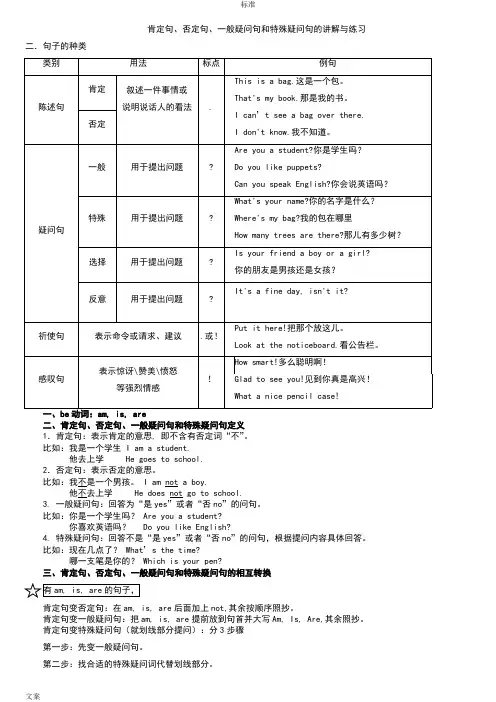
肯定句、否定句、一般疑问句和特殊疑问句的讲解与练习二.句子的种类 类别用法标点例句This is a bag.这是一个包。
肯定That's my book.那是我的书。
I can’t see a bag over there.陈述句否定叙述一件事情或 说明说话人的看法.I don't know.我不知道。
Are you a student?你是学生吗?Do you like puppets?一般用于提出问题?Can you speak English?你会说英语吗?What's your name?你的名字是什么?Where's my bag?我的包在哪里特殊用于提出问题?How many trees are there?那儿有多少树?Is your friend a boy or a girl?选择用于提出问题?你的朋友是男孩还是女孩?It's a fine day, isn't it?疑问句反意用于提出问题?Put it here!把那个放这儿。
祈使句表示命令或请求、建议.或!Look at the noticeboard.看公告栏。
How smart!多么聪明啊!Glad to see you!见到你真是高兴!感叹句表示惊讶\赞美\愤怒 等强烈情感!What a nice pencil case!一、be 动词:am, is, are二、肯定句、否定句、一般疑问句和特殊疑问句定义1.肯定句:表示肯定的意思, 即不含有否定词“不”。
比如:我是一个学生 I am a student.他去上学 He goes to school.2.否定句:表示否定的意思。
比如:我不是一个男孩。
I am not a boy.他不去上学 He does not go to school.3. 一般疑问句:回答为“是yes ”或者“否no ”的问句。
比如:你是一个学生吗? Are you a student?你喜欢英语吗? Do you like English?4. 特殊疑问句:回答不是“是yes ”或者“否no ”的问句,根据提问内容具体回答。
中考初中英语肯定句、否定句、一般疑问句和特殊疑问句的讲解与练习.docx
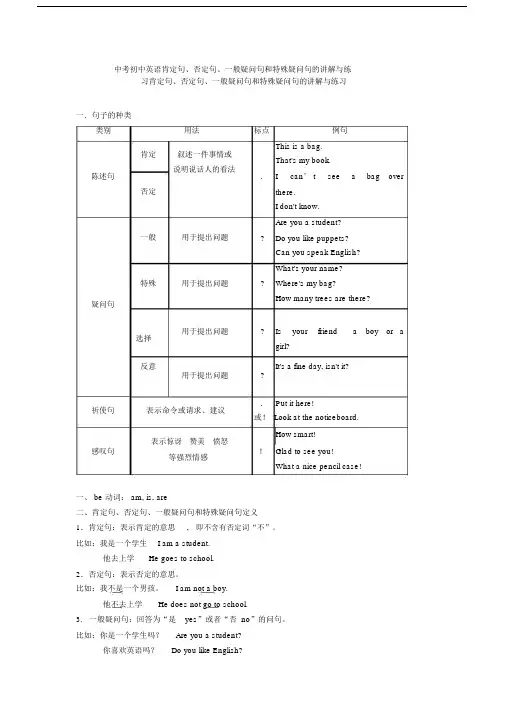
中考初中英语肯定句、否定句、一般疑问句和特殊疑问句的讲解与练习肯定句、否定句、一般疑问句和特殊疑问句的讲解与练习一.句子的种类类别用法标点例句肯定叙述一件事情或This is a bag. That's my book.说明说话人的看法陈述句.I can’ t see a bag over 否定there.I don't know.Are you a student?一般用于提出问题?Do you like puppets?Can you speak English?What's your name?特殊用于提出问题?Where's my bag?疑问句How many trees are there?选择用于提出问题?Is your friend a boy or agirl?反意用于提出问题?It's a fine day, isn't it?祈使句表示命令或请求、建议.Put it here!或! Look at the noticeboard.表示惊讶赞美愤怒How smart!感叹句!Glad to see you!等强烈情感What a nice pencil case!一、 be 动词: am, is, are二、肯定句、否定句、一般疑问句和特殊疑问句定义1.肯定句:表示肯定的意思,即不含有否定词“不”。
比如:我是一个学生I am a student.他去上学He goes to school.2.否定句:表示否定的意思。
比如:我不是一个男孩。
I am not a boy.他不去上学He does not go to school.3.一般疑问句:回答为“是 yes”或者“否 no”的问句。
比如:你是一个学生吗?Are you a student?你喜欢英语吗?Do you like English?4.特殊疑句:回答不是“是yes”或者“否 no”的句,根据提内容具体回答。
一般疑问句和否定句以及全面的配套练习
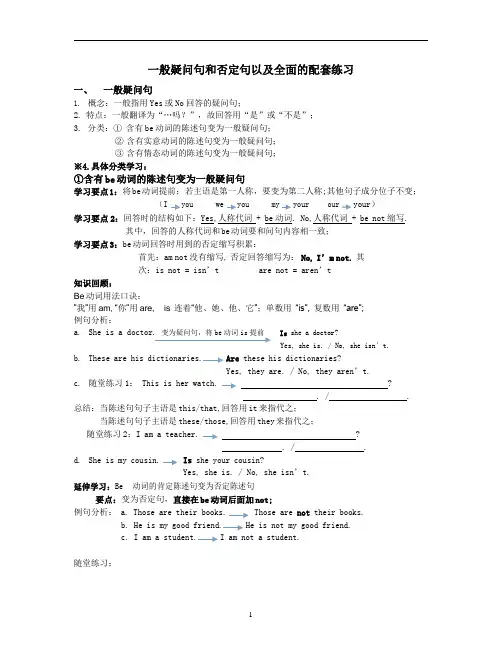
一般疑问句和否定句以及全面的配套练习一、一般疑问句1. 概念:一般指用Yes 或No 回答的疑问句;2. 特点:一般翻译为“…吗?”,故回答用“是”或“不是”;3. 分类:①含有be 动词的陈述句变为一般疑问句;②含有实意动词的陈述句变为一般疑问句;③含有情态动词的陈述句变为一般疑问句;※4.具体分类学习:①含有be 动词的陈述句变为一般疑问句学习要点1:将be 动词提前;若主语是第一人称,要变为第二人称;其他句子成分位子不变;(your your)学习要点2:回答时的结构如下:Yes,人称代词 + be 动词. No,人称代词 + be not 缩写.其中,回答的人称代词和be 动词要和问句内容相一致;学习要点3:be 动词回答时用到的否定缩写积累:首先:am not 没有缩写, 否定回答缩写为:No, I’m not.其次:is not = isn’t are not = aren’t知识回顾:Be 动词用法口诀:”我”用am, “你”用are, is 连着“他、她、他、它”;单数用“is”,复数用“are”;例句分析:a.Is she a doctor?Yes, she is. / No, she isn’t.b.Are these his dictionaries?Yes, they are. / No, they aren’t.c.随堂练习1: This is her watch. ?. /.总结:当陈述句句子主语是this/that,回答用it 来指代之;当陈述句句子主语是these/those,回答用they 来指代之;随堂练习2:?. /.d.Is she your cousin?Yes, she is. / No, she isn’t.延伸学习:Be 动词的肯定陈述句变为否定陈述句要点:变为否定句,直接在be 动词后面加not;例句分析:Those are not their books.b.He is not my good friend.c.I am not a student.随堂练习:This is my ruler.否定句:.一般疑问句:? Yes,. / No,.小试牛刀:1.She is always a good student.(改为一般疑问句,作否定回答)一般疑问句:?Yes,. / No,.2.Daniel and Tommy(be) in Class One.3.There(be) some water in the bottle.4.I(be) ill. I’m staying in bed.5.What day(be) it today? It’s Saturday.②含有实意动词的陈述句变为一般疑问句;学习要点1:找助动词do / does 构成疑问和否定;学习要点2: 一般疑问句也要找do/does,放句首构成疑问;例句分析1:I have an apple. : 我有一个苹果。
一般疑问句,否定句重要知识点
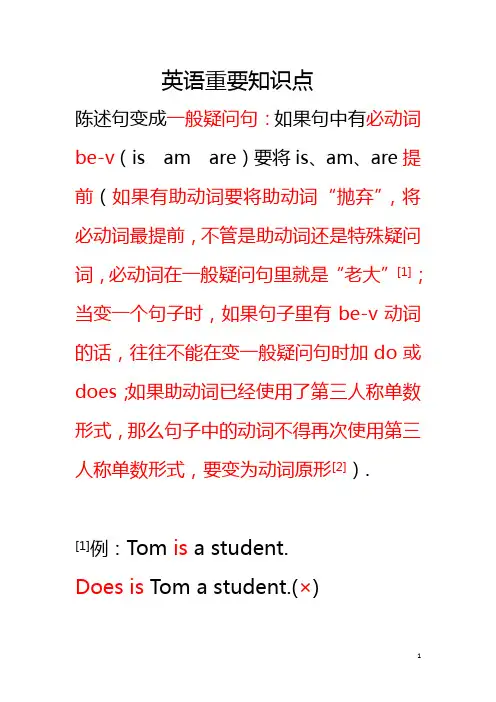
英语重要知识点陈述句变成一般疑问句:如果句中有必动词be-v(is am are)要将is、am、are提前(如果有助动词要将助动词“抛弃”,将必动词最提前,不管是助动词还是特殊疑问词,必动词在一般疑问句里就是“老大”[1];当变一个句子时,如果句子里有be-v动词的话,往往不能在变一般疑问句时加do或does;如果助动词已经使用了第三人称单数形式,那么句子中的动词不得再次使用第三人称单数形式,要变为动词原形[2]).[1]例:Tom is a student.Does is Tom a student.(×)Is Tom a student?(√)[2]例:Does he lives in Huang gang(黄冈,中国一城市).(×)Does he live in Huang gang.(√)用助动词do或does提问(do用于第一人称和第二人称单、复数和第三人称复数;does用于第三人称单数的he、she、it等);如果在第一人称的情况下,往往要将第一人称变为第二人称;在变一般疑问句时,要将动词变化为动词原形;如果陈述句里面有many/some,改一般疑问句或者特殊疑问句时,要将many/some改为any.一般疑问句系动词be 1.It is a pen.Is it a pen?2.He is a teacher.Is he a teacher?一般疑问句系动词be 3.We are students.Are you students?4.They are doctors.Are they doctors?一般疑问句助动词l(我)you(你)they(他们)用do 进行提问第三人称单数用does进行提问注:do为does的动词原形,当一个句子重复出现does,要将重复出现的does变为do.一般疑问句助动词I like dancing.Do you like dancing?You like read stories.Do you like read stories?这里stories为story的名词复数.一般疑问句助动词He lives in Sydney(悉尼,澳大利亚一城市)Does he live in Sydney?She likes apples.Does she like apples?Amy likes singing.Does Amy like singing?动词第三人称形式1.一般情况下,直接在动词后加s例:like--likes live--lives2.以字母s、x、ch、sh、或o结尾的动词后加es例:guess--guesses teach--teaches 3.以辅音字母+y结尾的动词后面变y为i 加es例:study--studies fly--flieslike+动词ingHe likes reading stories.My mother likes listening to music. Amy likes singing and dancing.关键词:often、every day、every week On weekend……看人称变化动词My mother goes to work by car every day.He does word puzzles(难题)every week.She comes to school on foot.1.He likes cooking(cook) Chinese food.2.My pen pal watches(watch) TV at night.3.Mike goes(go)to school on foot.4.Mr Bill teaches(teach) English.5.My parents often goes(go) hiking.6.She studies(study) English every day.7.Amy often reads(read) stories in the study.8.John likes doing kungfu.9.Mr Wang is thirsty.10.We like birds./n./ 名词./v./ 动词/adj./ 形容词/adv./ 副词/pron./ 代词/prep/ 介词否定句的讲解一般现在时表示现在经常反复发生的动作、存在的状态或习惯性的动作。
小学英语语法讲解及习题
语法第一讲重点:缩写形式;an & a & X 的用法;一般疑问句;否定句;肯定回答/否定回答;单数改为复数Ⅰ. 缩写形式I’m=I am he’s=he is she’s=she is they’re=they areyou’re=you are there’s=there is they’re=they are can’t=can notdon’t=do not doe sn’t=does not isn’t=is not aren’t=are notlet’s=let us won’t=will not I’ll=I will wasn’t=was not总结:通常情况下,'m即am,'s即is(但let’s=let us),'re即are ,n't即not (但can’t=can not)Ⅱ.an & a & X的用法a用在辅音音素前,包括以前元音[j]、[w]开首的词前,读作[E],强调时读作[ei]。
注意,这里讲的辅音音素指的是发音,不是指辅音字母。
an用在元音音素前(不是元音字母),读作[En],强调时读作[An]。
例:a hotel [hEu5tel]一家旅馆a knife [naif] 一把小刀a useful tool [5ju:sful] 一件有用的工具a university [7ju:ni5vE:siti] 一所大学a European country [7juErE5pi(:)En] 一个欧洲国家a one-eyed man ['wQn5aid] 一个一目失明的人an hour [5auE] 一小时an ant [Ant] 一只蚂蚁an honour [5CnE] 一种荣誉an honest boy [5Cnist] 一个诚实的男孩an umbrella [Qm5brelE] 一把伞an onion [5QnjEn] 一个洋葱an eye [ai] 一只眼睛an ear [iE] 一只耳朵an English book [5iN^liF] 一本英语书an egg [e^] 一只鸡蛋an apple [5Apl] 一个苹果an island [5ailEnd] 一座岛an uncle [5QNkl] 一位叔叔an old man [Euld] 一位老人an elephant [5elifEnt] 一头大象a D [di:] 一个D (B、C、G、J、K、P、Q、T、U、V、W、Y、Z前也用a)an F [ef] 一个F(A、E、H、I、L、M、N、O、R、S、X前也用an)Ⅲ.一般疑问句与否定句Be动词的用法口诀:我用am,你用are,is连着他,她,它;单数名词用is,复数名词全用are。
英语肯定句、否定句、一般疑问句和特殊疑问句的讲解与练习
英语肯定句、否定句、一般疑问句和特殊疑问句的讲解与练习肯定句、否定句、一般疑问句和特殊疑问句的讲解与练习一.句子的种类类别用法标点例句陈述句肯定叙述一件事情或说明说话人的看法.This is a bag.That's my book. 否定I can’t see abag over there.I don't know.疑问句一般用于提出问题?Are you astudent?Do you likepuppets?Can you speakEnglish?特殊用于提出问题?What's yourname?Where's my bag? How many trees are there?用于提出问题?选择Is your friend a boy or a girl?反意用于提出问题?It's a fine day, isn't it?祈使句表示命令或请求、建议.或!Put it here!Look at thenoticeboard.感叹句表示惊讶\赞美\愤怒等强烈情感!H ow smart!Glad to see you!What a nicepencil case!一、be动词:am, is, are二、肯定句、否定句、一般疑问句和特殊疑问句定义1.肯定句:表示肯定的意思, 即不含有否定词“不”。
比如:我是一个学生 I am a student.他去上学 He goes to school.2.否定句:表示否定的意思。
比如:我不是一个男孩。
I am not a boy.他不去上学 He does not go to school.3. 一般疑问句:回答为“是yes”或者“否no”的问句。
比如:你是一个学生吗? Are you a student?你喜欢英语吗? Do you like English?4. 特殊疑问句:回答不是“是yes”或者“否no”的问句,根据提问内容具体回答。
1月20日一般疑问句和特殊疑问句-讲解及练习
一般疑问句一、一般疑问句作答的疑问句叫一般疑问句。
其结构是be动词(am /is /are )主语+其他成分Yes,+主语+提问的词.否定:No,+主语+提问的词+not.Are you from Japan﹖Yes ,I am./ No, I'm not.Is her sister doing her homework now﹖Yes, she is./ No, she isn't.Does he work in a bank﹖Yes, he does./ No, he doesn't.Can you speak French﹖Yes, I can./ No, I can't.1.如句中有be 动词(am、is、are、was、were can、may、must …)可直接将它们提到句首,句末打上问号即可。
应将其改为第二人称。
例:It was rainy yesterday.→Was it rainy yesterday?Tom's father can play the piano.→Can Tom's father play the piano?2.如果句中没有be动词、助动词或情态动词,则根据谓语动词的形式借助do的相应形式放在句首。
具体方法是:如果谓语动词是原形,则借do;如果谓语动词是一般现在时第三人称单数形式,则借does;如果谓语动词是过去式,则借did. 需要注意的是,借does或did后,原句的谓语动词要变回原形。
例:They go to school by bike.→Do they go to school by bike?Bill gets up at 6:30 every day.→Does bill get up at 6:30 every day?The students saw a film yesterday.→Did the students see a film yesterday?二.陈述句变一般疑问句应注意的事项1.如果陈述句中有第一人称,则变问句时最好要变为第二人称。
肯定句、否定句、一般疑问句和特殊疑问句的讲解与练习
肯定句、否认句、一般疑问句和特殊疑问句的讲解与练习一.句子的种类类别用法例句陈述句肯定表达一件事情或说明说话人的看法This is a bag.That’s my book.I can’t see a bag over there.I don’t know.否认疑问句一般疑问句用于提出问题What’s your name"Where’s my bag"How many trees are there"特殊疑问句二.肯定句、否认句、一般疑问句和特殊疑问句的相互转换有am, is, are的句子,肯定句变否认句:在am, is, are后面加上_____,其余按顺序照抄。
肯定句变一般疑问句:把am, is, are_____放到_____并大写Am, Is, Are,其余照抄。
肯定句变特殊疑问句〔就划线局部提问〕:分3步骤第一步:先变一般疑问句。
第二步:找适宜的________代替划线局部。
第三步:特殊疑问词____放到_____,并大写,其余按顺序照抄.注意:1.一定先变一般疑问句。
但是,如果问的是主语或主语的定语时,语序不变,为"特殊疑问词(+主语)+陈述句"。
如:Liming 's not here today.Who's not here today" 今天谁没来?2.划线局部不能在特殊疑问句中出现。
学过的特殊疑问词有:when, who, why, where, what, what time, what color, what day, what date, how, how old, how many, how much 等等**语法专练**一、填入所缺的疑问词1.--_______do you like summer" -- Because I can swim.2.--is the post office" -- It’s ne*t to the cinema.3.--______can I get to Zhong Shan Park" --By underground.4--.______ _______ are you" -- I’m 14 years old5.--______ ______ is it" --It’s Monday.6.--_____ _____ does it take to your school. --About ten minutes.7.-- _______is your skirt, Amy" --It’s 100 yuan.8.--____ is today" --It’s February, fifth.二.句型转换1. There are 50 students in our class.否认句:______________________________________________一般疑问句:_______________________________________特殊疑问句:_______________________________________2. It takes Mike thirty minutes to go to school.一般疑问句:___________________________________________________否认句:_________________________________________________________3. I usually play football on Friday afternoon.否认句:__________________________________________________________一般疑问句:____________ __________________________________________就划线局部提问_______________________________ ____________________4. The book costs Mary ten yuan. 否认句:________________________________________________________一般疑问句:______________________________________________________ 划线提问:____________ ____________________________________________5. Today is February 5th, Tuesday. 否认句:____________ ______________________________________________ 一般疑问句:________________________________ ______________________ 划线提问_________________________________________________________ 6. Tom does his homework at home. 否认句:_______________________________________________________ ___ 一般疑问句:______________________________________________________ 划线提问_________ ________________________________________________7. Angela goes to school by subway.否认句:__________________________________________________________ 一般疑问句:__________ ____________________________________________ 划线提问_____________________________________ ____________________三.单项选择( )1.How many story books do you have "A.I have 10.B.I can see 10.C.Thirty yuan.( )2.Do you have new teachers"A.Yes,we do .B.Yes,we don’t.C.Yes,we have .( )3.Who’s your art teacher "A.Mr Zhu.B.Miss Zhu.C.He’s tall.( )4.What’s he like"A.He’s tall and strong .B.Yes,he is.C.Mr Zhu.( )5.Is your English teacher young"A.No,she isn’t.B.Yes,she is .C.No,she is.( )6. " Her name is Chen Jie.A.What’s your name "B.What’s she name "C.What’s her name "( )7. " I like Chinese,math and English.A.What classes do you like"B.What do you like"C.What are you like "( )8." It’s Monday.A.What is it today "B.What day is it today "C.What day is today "( ) 9. ______" It’s eight.A. What day is itB. What’s five and threeC. How old are youD. What’s your telephone number( ) 10. ______ is a ticker for the film Hacker He"-About forty yuan .A. How oldB. How manyC. How muchD. How often( )11. How are you "A.Fine,thanks.B.Yes,it is.C.How are you "( )12. How do you go to school "A.I go to Canada by plane.B.I go to school by bike.C.What about you "( )13. How do you go to the USA "A.I usually go to school by bus.B.I go to England by ship.C.I go by plane.Part B综合练习一.完型填空Linda is an English girl.She is twelve years old.She has two brothers. 1 are Jack and Jim. But she doesn’t 2 any sisters.Linda goes to school by 3 . She usually 4 to school at eight o’clock. The first class 5starts at nine o’clock.She has five classes every day. Her favorite 6 are math and science. She has math from Monday 7 Friday.On weekends, she 8 her brother with his homework at home. Sometimes she listens to music. She likes 9 very much. Her favorite musician is Liu Huan from China.She thinks his songs are very 10 .She likes them very much.( )1.A. We B. You C.They( )2.A. have B. know C. find( )3.A. radio B. bus C. watch( )4.A. leaves B. takes C. gets( ) 5.A. book B. class C. picture( )6.A.subjects B. clothes C. colors( ) 7.A. of B.at C. to( )8. A.asks B says C helps( )9. A.dancing B.singing C. running( )10. A.rela*ing B. boring C. difficult二.完成对话A: Hi, John.B: Hello, Kate, ___1___ is that girl over there"A: You mean the girl ___2___ red" She is my new classmate , Anne.B: Is she from England"A: No. She is from America. She is an ___3___.B: Why does she e ___4___ China"A: Her parents are working in China now.B: You mean the two foreign___5___ in our school"A: Yeah. She is ___6___ daughter.B: Does she ___7___ English"A: Of course.B: Maybe you can ___8___ her to help you ___9___ your English.A: How about her ____10____.B: She can only speak a little Chinese. So we can help each other.A: That sounds a good idea.三.五选五What means of transportation(交通工具) do you like"Alan I find it’s hard to answer this question. I fear (害怕) any kind of transportation, so it’s hard to choose (选择). If I have to, I’d choose the plane . 1 Becky I don’t like taking trains. There are always problems with trains. They’re often late. So I never take a train. 2Sally 3 Because I like traveling (旅行) by bicycle, by plane, by boat, by car ... But I like walking best. I enjoy walking.BobMy favorite way of traveling is my puter mouse (鼠标). 4 I can go around the world in a few minutes. 5A.I use my car and always get to the place that I want to go quickly.B.It is the fastest means of transportation.C.I can speak to people from all over the world, and look up (查阅) things quickly too.D.Answering this question is very difficult.E.It’s quick, rela*ing, and we can get food and drink on the it.1.________2.________3._______4._______5.________Part 3 listeningA.听句子〔共5小题,每题1分,共5分〕根据所听句子的内容和所提的问题,选择符合题意的图片答复下列问题,并将答案写在题前的括号内。
- 1、下载文档前请自行甄别文档内容的完整性,平台不提供额外的编辑、内容补充、找答案等附加服务。
- 2、"仅部分预览"的文档,不可在线预览部分如存在完整性等问题,可反馈申请退款(可完整预览的文档不适用该条件!)。
- 3、如文档侵犯您的权益,请联系客服反馈,我们会尽快为您处理(人工客服工作时间:9:00-18:30)。
般疑问句的结构:
1•当句子中有be动词时,:Be + 主语+ 其它
Are you a stude nt
-Yes. I am. / No, I'm n ot.
I am a girl. _________________________________________________
He is cute. ________________________________________________________
They are always late for school. _____________________________________________________________ Your father is a doctor. _____________________________________________________________________ 2.当句子中没有be,只有动词:Do( Does ) +主语+动词原形+其它。
女口:
-Do you ofte n play football
-Yes, I do. / No, I don't.
当主语为第三人称单数时,要用does构成一般疑问句。
如:
-Does she go to work by bike
-Yes, she does. / No, she does n't.
He ofte n goes to school by bus.
They like to go to the zoo.
She always goes home late.
否定句的结构
1.当句子中有be的时候:主语+ be + not+其他
I am not a boy.
She is not a girl.
They are my friends _______________________________________________________
He is my brother _______________________________________________________________
2.当句子中没有be,有动词的时候:主语+ don 't( does n't ) +动词原形(+其它)。
I don't like bread.
当主语为第三人称单数时,要用does n't构成否定句。
He does n't ofte n play.
I eat meat. ______________________________________________________________
You play chess _____________________________________________________________
She always does the housework on Sun day.
The dog plays with its tail all the day.
一、用所给动词的一般现在时填空。
1. We ofte n ____________ (play) in the playgro unnd.
2 _______________ you _______________ (brush) your teeth every morni ng
3.What ____________ (do) he usually ___________ (do) after school
4.Dann ____________ (study) En glish, Chin ese, Maths, Scien ce, and Art an school.
5.Mike sometimes ______________ (go) to the park with his sister.
6.At eight at ni ght, she _____________ (watch) TV with his family.
7.__________ Mike _______________ (read) English every day
8.How many less ons ____________ your classmate________________ (have) on Mon day
9.What time ___________ his mother ________________ (do) the housework
二、按要求改写句子。
1)Do you often play football after school 改为肯定句)
2)I have some books.改为否定句)
3)Gao Sha'sister likes playing table tennis.改为否定句)
4)She lives in a small town near New York改为一般疑问句)
5)I watch TV every day.改为一般疑问句)
6)We have four lessons.(改为否定句)
7)Nancy doesntrun fast.(改为肯定句)
三、单项选择。
( )1. ___________ you have a book
A. Do
B. Are
C. Is
D. Have
( )2. They ___________ on a farm.
A. worki ng
B. is work
C. work
D. is worked
( )3. Does Peter like to watch TV _____________________________ .
A. Yes, he like
B. No, he doesnt
C. Yes, h' like
D. No, he likes
( )4. She does' _______________ her homework in the after noon.
A. doing
B. to do
C. does
D. do
( )5. Where'my camera J ______________________ it.
A. am not finding
B. am not see ing
C. cantfi nd
D. can 'look at
( )6. __________ you usually late for school No, _____________________ .
A. Do, I am
B. Does, not
C. Are, ' not
D. Are, I arent
( )7. __________ she ___________ home at six every day
A. Is, leave
B. Does, leave
C. Is, leaves
D. Does, left
( )8. Mr. Yang _______________________ English this term.
A. teaches our
B. teaches us
C. teachs us
D. teach our
I have 3 new teachers. They are my En glish teacher, my teacher and my Chin ese teacher. Miss zhao is pretty and active. She's a university student. She's our English teacher. My teacher is Mr. Chen. He's tall and strong, and he's strict, too. Miss Sun is my Chin ese teacher. She's quiet. She has long hair and big eyes.
( )1.1 have new teachers. A. twoB. threeC. four
( )2. Miss Zhao is myteacher. A. En glishB. Chi neseC. PE
( )3. Mr. Che n is . A. tall B. stro ng C. tall a nd strong
( )4. Is my teacher strictA. Yes, she is B. Yes, he is C. No, he isn't
( )5. Miss Sun is . A. quiet B. active C. strict。
